Foreigners Endorsing Crypto: An Alternative Business Model in the Crypto World
A combination of Chinese and Western styles, everyone makes money together.
Author: Yanz, Deep Tide TechFlow
During the Bitcoin Asia event in Hong Kong, Binance founder CZ and Eric Trump, son of Donald Trump, made appearances one after another... This conference was supposed to be exclusive to elites and crypto industry heavyweights.
However, the real scene-stealer was a white T-shirt printed with four Chinese characters: "Foreigner Endorsement."
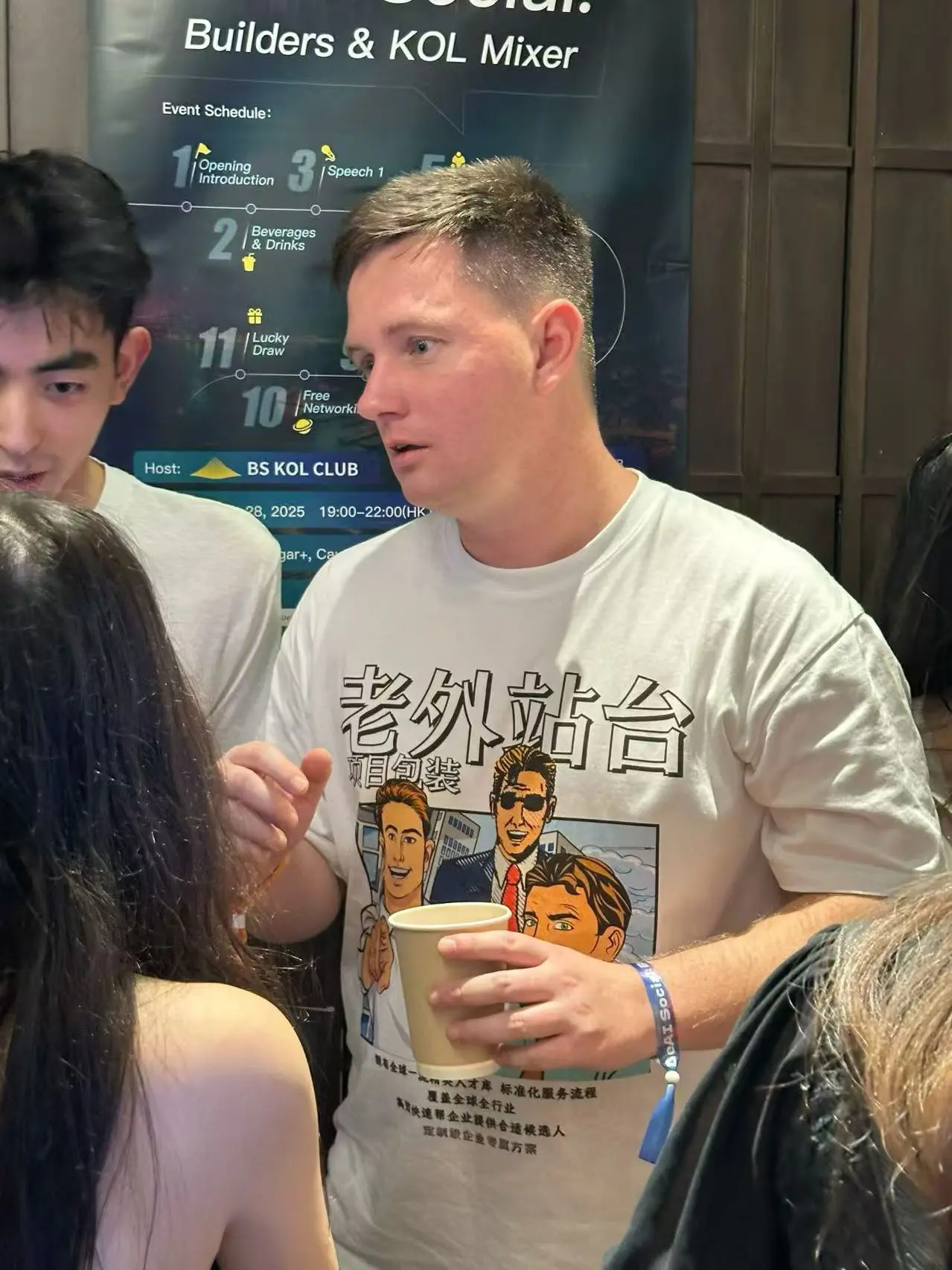
The person wearing it had a Western face.
When he stood shoulder to shoulder with Changpeng Zhao for a photo among the crowd, questions immediately arose:
Who is he? And what kind of business is "foreigner endorsement"?
Foreigners in the Crypto World
This eye-catching foreigner is named Dane, founder of the crypto agency 4am global.
After graduating from Oxford University with a degree in computer science, a trip brought him to China, where he has stayed for thirteen years. In his own words: "If I didn't like it here, I would have left long ago."
Like many Chinese university graduates, Dane was once a "Beijing drifter," working as a "foreign laborer" in Beijing's tech and internet companies. Years of living in China not only made him fluent in Chinese, but also familiar with Chinese social customs, and he even became a fan of TV dramas like "Empresses in the Palace" and "Temptation to Go Home."
The so-called "foreigner endorsement" is a special service model in the crypto world: providing foreign representatives for Chinese blockchain projects to enhance their international image and credibility. In English, this kind of service is called White Monkey. But in Dane's view, it's far more than just a "white face"—it's a complete package including international branding, resource connections, and market communication.
"Many people think we only do the packaging of 'foreigner endorsement,' but in fact, we are a purely foreign team, and 80% of our clients are from European and American projects," he said.
The origin of this business dates back to his own experience standing in as a representative for a Chinese public chain's overseas BD in 2018. As he delved deeper into the industry, Dane realized: Chinese projects are well-funded, technologically capable, and rich in exchange resources, but what they lack is an international image, market sense, and cross-cultural communication skills.
Moreover, with domestic regulation of the crypto industry tightening for a long time—starting from the closure of exchanges in 2017 to the complete ban on crypto trading and mining in 2021—many founders became even more reluctant to show their faces, so "finding a foreign expert to speak on their behalf" became a rigid demand.
Thus, the "foreigner endorsement" business emerged. Dane recalls that at a conference in Hong Kong, many Chinese projects proactively approached him for services, "At least 50% of Chinese project teams have such needs," and even large exchanges invited him to serve as CEO.
"At the time, I thought it was ridiculous, but after in-depth research, I found that this demand is actually reasonable."
White Monkey
There is nothing new under the sun.
Ten years ago, during the heyday of China's real estate industry, the service of renting "Western faces" was already popular. The New York Times wrote at the time: "Stuffing foreign faces into remote buildings, even for just one day, is enough to prove 'internationalization' here."
DeRucci mattresses, with the face of a British model, wove a story of "originating from French designer DeRucci in 1868," selling thousand-yuan mattresses for tens of thousands. It wasn't until just before the IPO that the CSRC revealed the truth: it was merely a 2009 portrait rights agreement, and the so-called French lineage was entirely fabricated.
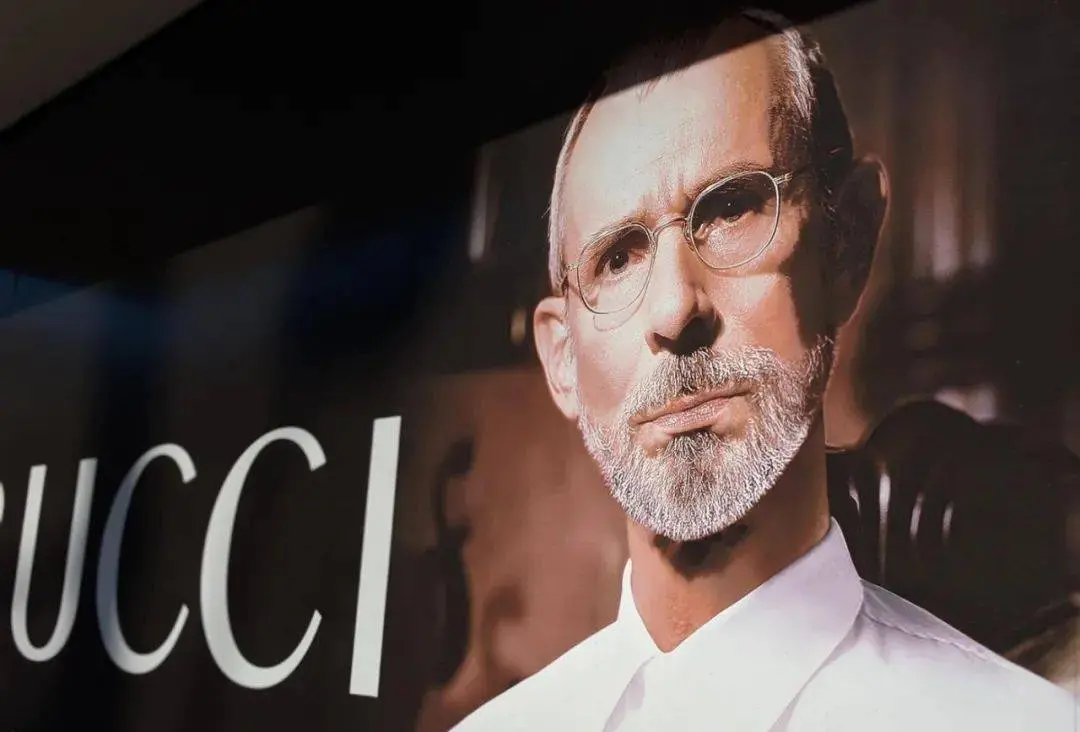
This kind of packaging has a fixed term in the West: White Monkey.
This industry has existed for half a century. As long as you are white, you hardly need any skills to appear on stage, in offices, or in advertisements, playing the role of "foreign executive," "company spokesperson," or "foreign expert."
On the Reddit forum, many foreigners share their experiences of being White Monkeys in East Asia:
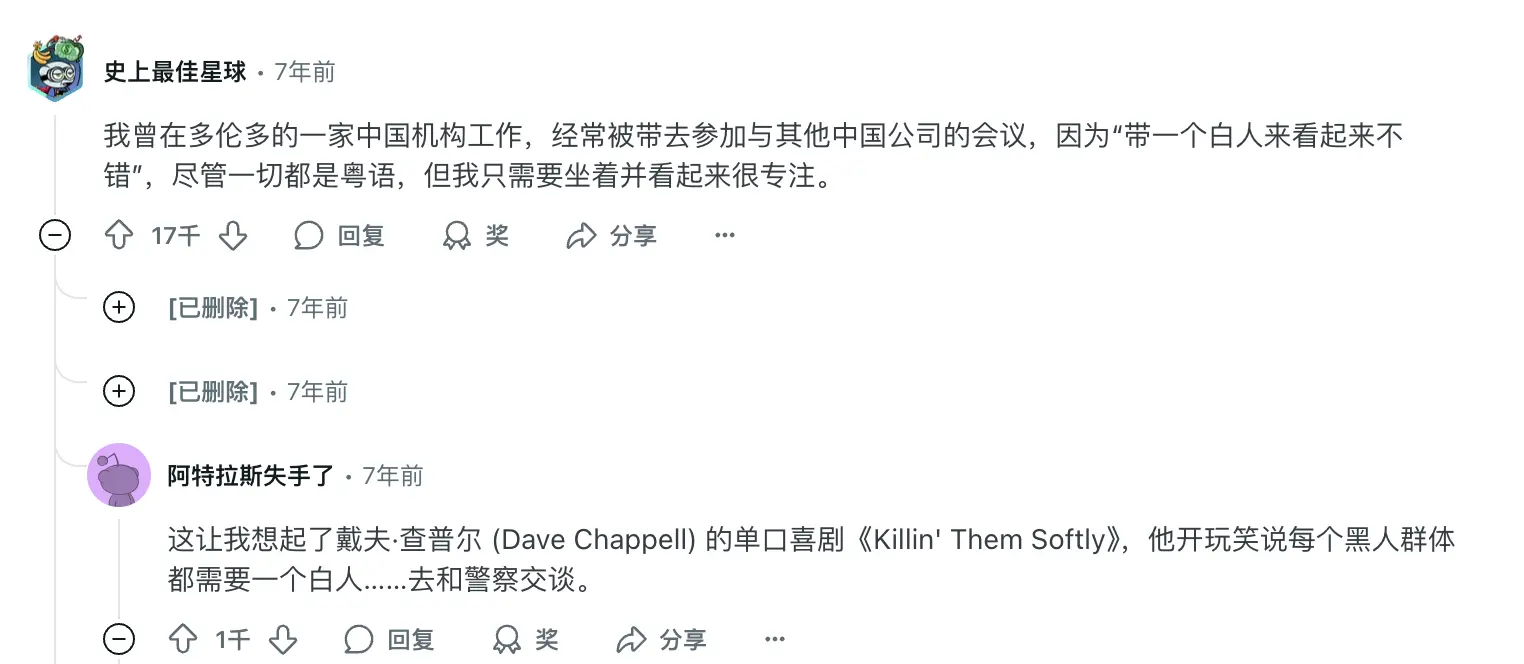

As The Spectator reported in 2022, "White men and women can even be hired as office staff, with no actual responsibilities, just to create a more sophisticated international atmosphere."
This "atmosphere economy" is also prevalent in the crypto industry.
In 2017, many project teams could raise funds with just a white paper. Alex's team not only ghostwrote white papers but could also "find foreign actors." "Back then, you could easily find a white foreign student at the gates of 'Beiwai' or 'Beierwai' to act as CEO and easily raise tens of thousands of ethereum," he still marvels at the craziness of those days.
There were even cases where a Chinese team hired a white male model from a Shanghai nightclub as CEO, but the model turned the tables, seized control of the project in the name of a DAO, kicked out the original team, and with the help of Middle Eastern capital, the project's market cap once reached 7 billions USD.
And it's not just amateurs.
In 2020, Apple co-founder Steve Wozniak was hired by a Chinese team to issue the cryptocurrency WOZX, which once had a market cap of 1 billions USD, but now is only worth 1 million USD, nearly zero.
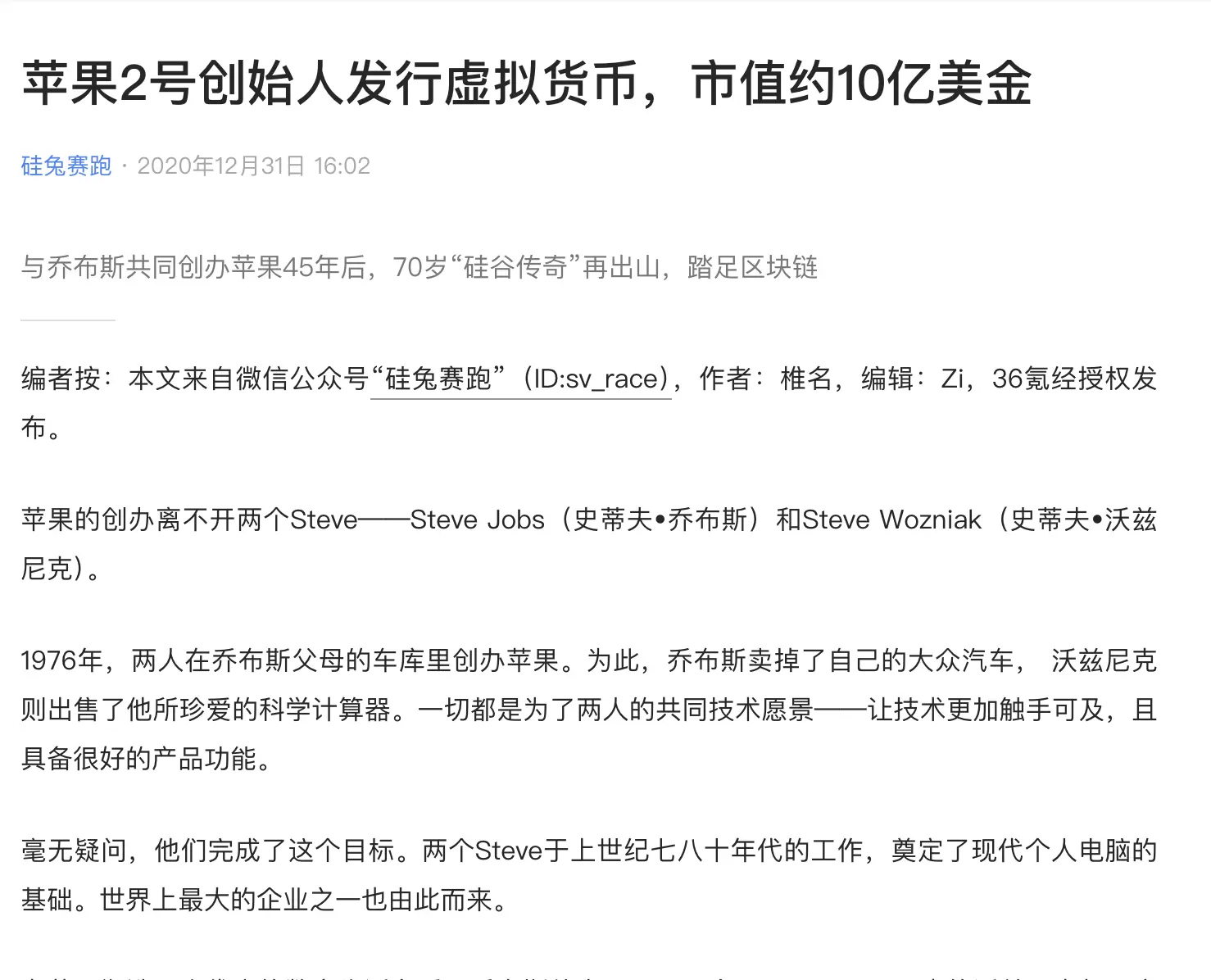
In 2025, former Serbian President Boris Tadic posted on X confirming his role as CEO of a certain token foundation. According to insiders, the team behind the token is based in Hong Kong.
In February this year, Argentine President Milei was embroiled in scandal for retweeting $LIBRA token promotions on social media, and later urgently distanced himself. The Economist called this the "first major scandal" of his term.
In Alex's view, "foreigner endorsement" is also constantly evolving.
At first, it was just about taking photos or recording videos, just to get by. But as the bubble burst and retail investors became harder to fool, the endorsement model entered version 2.0: the real boss is still Chinese, but CEO and other executive positions are held by foreigners. These people are no longer just actors; at least they have skills in public speaking and BD (business development), providing stronger market credibility. "East meets West, everyone makes money together."
As for the reasons, Alex bluntly says the most important are regulatory and compliance pressures forcing founders to stay hidden, and on the other hand, the filter of retail investors.
In China, Japan, and Korea, people generally believe that Western faces mean "internationalization," while local projects are easily labeled as "Ponzi schemes" or "shitcoins." For many projects, lacking a decent international image means it's hard to get VC and exchange investment, and hard to win retail investor recognition.
Under this filter, Dane has seen many absurd scenarios: During the pandemic, many Ponzi and shitcoin projects would randomly find a foreign student to act as CEO and go on roadshows everywhere. In the next city, they'd switch to a new "foreigner" as the successor.
"A different CEO in every city, it's utterly ridiculous. If a project has substance, it should find a foreigner who truly has substance," he says bluntly.
After truly getting involved in the business, Dane realized that "foreigner endorsement" is far from as simple as hiring a foreigner to take photos. Language barriers, cultural differences, time zone issues, relationship maintenance... Compared to simply using a face or spokesperson, it requires a professional intermediary to continuously facilitate and manage, in order to support so-called internationalization.
Being an Intermediary Isn't Easy
In the crypto world, being a "foreigner intermediary," Dane says, is far more challenging than imagined. Language barriers, cultural differences, and time zones make it difficult for Chinese teams and foreign talent to directly understand each other.
The first step is always "needs matching." Some projects want experts familiar with DeFi or RWA, while others require candidates to be based in a certain country or city. Dane must constantly negotiate between both sides' conditions. "Some requirements are reasonable, some are pure fantasy—when there are too many conditions, we really can't do it."
Over the past three years, Dane has traveled to conferences worldwide, building a vast network. About 80% of the time he can find suitable candidates, but the remaining 20% often ends in disappointment. In theory, he could just be a "headhunter," introducing people and then leaving, but in reality, less than 5% of projects work out this way. For 95% of projects, the intermediary must also act as translator, coordinator, and even event babysitter.
"If you don't keep communicating in the middle, both sides will quickly have conflicts and may not want to continue working together. Cultural differences are the biggest challenge."
Besides matchmaking, relationship maintenance is even more crucial. Dane regularly chats with European and American talent, helps them open accounts, or meets up at conferences to catch up. "Many Western professionals aren't short of money; what's truly important is the sense of relationship. The core of the foreigner endorsement service is maintaining long-term trust."
However, this business has also spawned chaos. Some people resell a "Western talent" who costs 3,000 USD/month for over 10,000, and the threefold markup makes Dane shake his head: "I think they'll ruin their reputation sooner or later, but you can't deny there are a lot of such people."
A shirt with four Chinese characters has brought Dane a lot of attention, as well as many "blunt and brazen" comments. As the only one in the team who understands Chinese, even his employees don't know what "foreigner endorsement" means.
But it cannot be denied that, in the English context, the business known as White Monkey does have significant demand, and he has helped Chinese projects successfully raise 5 millions USD. Compared to the offensiveness of the term, he cares more about gaining market attention.
Looking to the future, he even plans to expand the business to Web2 listed companies, "In traditional industries, this kind of demand will only be greater."
Disclaimer: The content of this article solely reflects the author's opinion and does not represent the platform in any capacity. This article is not intended to serve as a reference for making investment decisions.
You may also like
Forward Industries to tokenize company stock and operate fully on Solana blockchain

Get Your Bitcoin and Ethereum via PayPal: P2P Payments Have Just Entered the Cryptocurrency Space
PayPal has launched peer-to-peer payments for Bitcoin and Ethereum, allowing users to send and receive cryptocurrencies directly through its platform more easily than before.
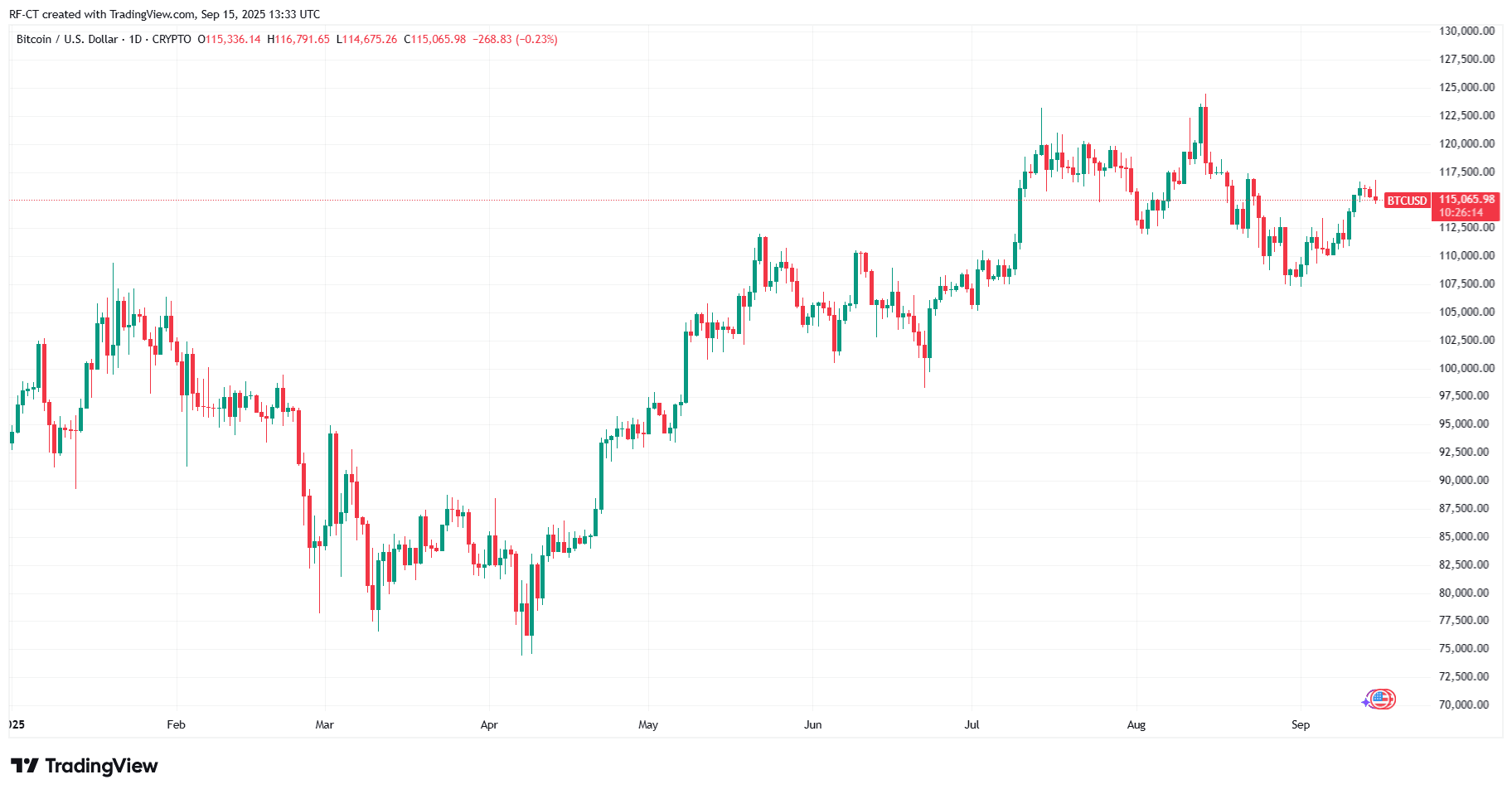
Bitcoin eyes long liquidations as gold passes $3.7K for first time
Bitcoin analyst predicts 35% rally after 9th bullish RSI signal fires
